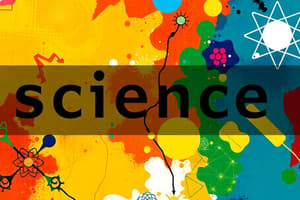Podcast
Questions and Answers
What is the primary focus of natural sciences?
What is the primary focus of natural sciences?
- Study of human behavior
- Study of abstract concepts
- Study of natural phenomena (correct)
- Study of logical reasoning
Which branch of science includes the study of computation and information processing?
Which branch of science includes the study of computation and information processing?
- Social Sciences
- Natural Sciences
- Formal Sciences (correct)
- Physical Sciences
What is the first step of the scientific method?
What is the first step of the scientific method?
- Analysis
- Observation (correct)
- Hypothesis
- Conclusion
Which characteristic of science emphasizes the need for experiments to be reproducible?
Which characteristic of science emphasizes the need for experiments to be reproducible?
How does science contribute to decision-making in policy?
How does science contribute to decision-making in policy?
Flashcards are hidden until you start studying
Study Notes
Definition of Science
- Systematic enterprise that builds and organizes knowledge.
- Involves observation, experimentation, and the formulation of laws and theories.
Branches of Science
-
Natural Sciences
- Study of natural phenomena.
- Includes:
- Physics: Study of matter, energy, and their interactions.
- Chemistry: Study of substances and their transformations.
- Biology: Study of living organisms and life processes.
-
Formal Sciences
- Study of abstract concepts and systems.
- Includes:
- Mathematics: The study of numbers, quantities, and shapes.
- Logic: The study of reasoning and argument structure.
- Computer Science: Study of computation and information processing.
-
Social Sciences
- Study of human behavior and societies.
- Includes:
- Psychology: Study of the mind and behavior.
- Sociology: Study of social behavior and society.
- Economics: Study of production, distribution, and consumption of goods.
Scientific Method
- A systematic approach to inquiry:
- Observation: Gathering information and noticing phenomena.
- Question: Identifying a problem or a question to be answered.
- Hypothesis: Formulating a testable prediction.
- Experimentation: Designing and conducting experiments to test the hypothesis.
- Analysis: Interpreting data collected from experiments.
- Conclusion: Drawing conclusions based on analysis.
- Communication: Sharing findings with the scientific community.
Characteristics of Science
- Empirical: Based on observation and experimentation.
- Repeatable: Experiments and results should be reproducible.
- Falsifiable: Hypotheses must be testable and disprovable.
- Objective: Minimizes bias and personal influence.
- Progressive: Builds upon existing knowledge and theories.
Importance of Science
- Advances technology and medicine.
- Enhances understanding of the natural world.
- Informs policy and decision-making.
- Promotes critical thinking and problem-solving skills.
Definition of Science
- Systematic enterprise focused on building and organizing knowledge.
- Relies on observation, experimentation, and the development of laws and theories.
Branches of Science
-
Natural Sciences: Examine natural phenomena.
- Physics: Investigates matter, energy, and their interactions.
- Chemistry: Analyzes substances and their reactions.
- Biology: Explores living organisms and their processes.
-
Formal Sciences: Address abstract concepts and structures.
- Mathematics: Concerns numbers, quantities, and shapes.
- Logic: Studies reasoning and the structure of arguments.
- Computer Science: Focuses on computation and information processing.
-
Social Sciences: Analyze human behavior and societies.
- Psychology: Examines the mind and behavior.
- Sociology: Investigates social behavior and societal structures.
- Economics: Studies the production, distribution, and consumption of goods.
Scientific Method
- A structured approach for inquiry:
- Observation: Collecting information and noticing phenomena.
- Question: Identifying problems or questions needing answers.
- Hypothesis: Crafting testable predictions.
- Experimentation: Designing and executing experiments to evaluate hypotheses.
- Analysis: Interpreting data from experiments.
- Conclusion: Drawing insights based on the analysis.
- Communication: Disseminating findings to the scientific community.
Characteristics of Science
- Empirical: Grounded in observation and experimental evidence.
- Repeatable: Results must be reproducible under similar conditions.
- Falsifiable: Hypotheses should be testable and capable of being disproven.
- Objective: Minimizes biases and personal influences in research.
- Progressive: Builds upon existing knowledge and theories, evolving over time.
Importance of Science
- Drives advancements in technology and medicine.
- Deepens understanding of the natural world and its processes.
- Aids in informed policy-making and decision processes.
- Fosters critical thinking and problem-solving abilities.
Studying That Suits You
Use AI to generate personalized quizzes and flashcards to suit your learning preferences.



